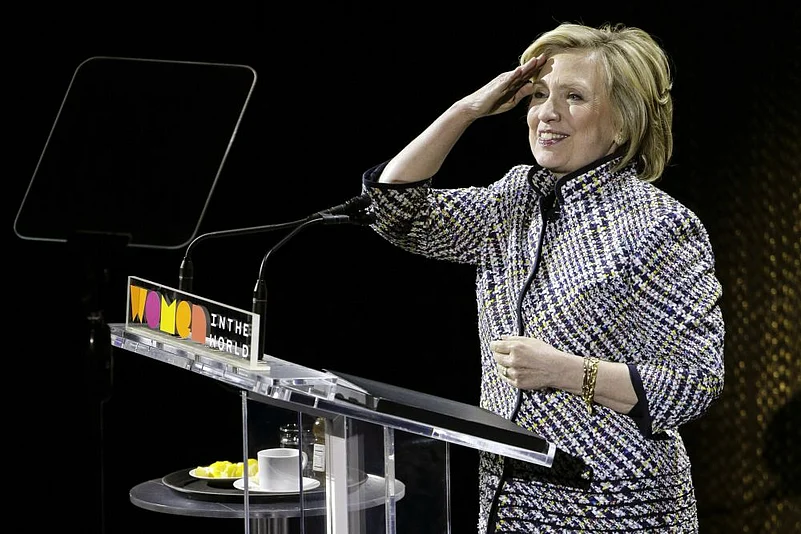After 43 men in the world's hottest seat, a woman wants to claim the Oval Office. Hillary Clinton is eager to crack the "highest, hardest glass ceiling" — American glass having proved itself the most tenacious. She failed in 2008 when Barack Obama went on to crack what may perhaps, be called the cement ceiling to become the first African American president of the United States.
If the social project of ceiling cracking continues in 2016, America may finally join the ranks of the "developed" world and inaugurate a woman president. It's impossible not to be snarky about the world's most powerful democratic country lagging behind Europe, Africa, Latin America and Asia in this metric. American women got the right to vote in 1920 but remain underrepresented at every political level — they hold fewer than 20 percent of the seats in the US Congress despite being a majority of the population. The US ranks 98th for women in the national legislature, behind Kenya and Indonesia.
Advertisement
Perhaps, the image of a woman in a lavender skirt or pantsuit doesn't gel with the rather militaristic imagery surrounding the American presidency in the eyes of the establishment. The concept of a commander-in-chief warrior president is embedded deep in the national psyche — 31 presidents did some form of military service. But that was "yesterday."
Societies evolve and America is no exception but the so-called "political strategists" weren't smart enough to notice in 2008. Clinton herself didn't have the confidence to press her gender as a positive then. Her strategist Mark Penn ordained that if she emphasized her gender, male voters would likely wonder if she were up to the job as is customary in boardrooms and government offices. This was despite the fact that voters found the possibility of electing the first woman president as the most appealing aspect of her campaign. She ran as a safe status quo-ist, pretending to be a different looking male.
Advertisement
Eight years later, voters still feel the same. A Gallup poll found that Clinton's gender remains her USP — one in five voters find the possibility of sending the first women to the White House a most attractive proposition. And she has learnt the lesson. When Clinton announced her second bid in April she went totally gender: "I expect to be judged on my merits, and the historic nature of my candidacy is one of the merits that I hope people take into account."
But an American presidential election is not just about making history. It is also about the candidate's history, which if it happens to be complicated — as in Clinton's case — the going can get tough. Each news cycle can spring a nasty surprise as she is finding out. Over the last year a string of Hillary scandals has unfolded, sucking oxygen out of her campaign. The drip-drip of revelations and her "reflexive secrecy" have the potential of drowning her bid in a swirl of allegations. The party bigwigs are said to be worried.
There is the e-mail scandal (using a private e-mail account and server at home for official business while secretary of state), the Benghazi scandal (she allegedly failed to adequately protect the US consulate and claimed the attacks were spontaneous when they were planned), a conflict of interest scandal (Bill and Hillary's multi-million dollar speech enterprise with alleged quid pro quos to donors), and the Clinton Foundation scandal (tax issues, lack of transparency in accounting for international donors who may have received US government largesse when Hillary was secretary of state).
In addition, Huma Abedin, Clinton's longtime principal aide, is now embroiled in controversy. Abedin, daughter of an Indian father and Pakistani mother, enjoyed a "special government employee" status while Clinton was at the State Department, which allowed her to work simultaneously at three places — the government, the Clinton Foundation and a consulting firm — and draw three salaries. The term flexibility doesn't even begin to describe the resultant mess. News of Abedin's situation leaked recently after the Senate Judiciary Committee failed to get satisfactory answers from the State Department for two years.
Advertisement
No wonder, several US media websites — not just the extreme right-wing fringe, which has a special hate relationship with the Clintons — have helpful guides to the many scandals. Lower down the scale are the Clinton gaffes like when she portrayed herself as financially strapped. She told ABC News last year that the family was "dead broke" when they left the White House. Yet, the Clintons found enough loose change to buy a $1.7-million house in New York state before leaving the White House and then another in Washington for $2.8 million.
Since January 2014, Hillary Clinton earned $11.7 million for delivering 51 speeches, while Bill made more than $14 million in the same period. Her personal net worth at $21 million makes her the richest contender across both parties barring Donald Trump. With membership in the 1 percent, connecting to the 99 percent and minimum-wage earners struggling to make ends meet is more difficult. It also blurs the usual appeal of a Democratic candidate as being more pro-people than Republicans who are traditionally seen as tied to corporate interests. But Clinton has cast herself as a "champion of everyday Americans."
Advertisement
Further troubles can come if the Republicans, who have long tried to portray the Clintons as people who don't follow rules, choose cheerfully to dig further into the couple's past — a landscape littered with shards of political glass. The eight years of Bill Clinton's presidency had its share of scandals — Whitewater (a controversial real estate deal in Arkansas), the women (Paula Jones, Gennifer Flowers, Monica Lewinsky to name a few), White House deputy counsel Vince Foster's suicide and removal of his files by Clinton aides, and finally his impeachment by the House of Representatives. Although the Senate acquitted him, the humiliation can always be revisited since Bill could potentially be First Husband. Republican contender Rand Paul has already asked if the American people want to let a "serial philanderer" back into the White House. Ouch.
Advertisement
Who said the road to the White House was easy? But Hillary Clinton intends to draw on her professional experience as a US senator and a globe-trotting secretary of state to convince voters she is the best person for the job. The Republicans want to knock her off that pedestal and keep her on the defensive.
Polls show that Clinton does have a "trust" problem even if people believe in her capability to do the job. The latest NBC/Wall Street Journal poll released on Aug. 3, says she is viewed unfavorably by 48 percent of likely voters and favorably by 37 percent. A CNN poll last month showed 57 percent of the respondents did not consider her trustworthy. What's worse is that Americans think Hillary Clinton is about as trustworthy as Donald Trump. While Republicans and independent voters are more likely to view her negatively, many Democrats think she is less than honest but 59 percent would still vote for her.
Advertisement
The lack of trust is costing Clinton in terms of firing up the Democratic base, which is lining up behind Bernie Sanders, a 73-year old socialist senator from Vermont and her rival for the Democratic nomination. The liberal wing of the party first tried to draft Senator Elizabeth Warren, a firebrand who took on big banks and even wrangled with Obama, but when she refused, the support shifted to Sanders. Ordinary Americans are filling up stadiums to listen to his call for a "political revolution" against the "billionaire class" and income inequality. Sanders led the largest rally so far of any candidate in either party with 10,000 people in Wisconsin.
Advertisement
Clinton will, no doubt, "adjust" her positions leftward to connect to the liberals but can she do an image-makeover to be more appealing to independents and disillusioned Republicans? Her campaign so far has lacked fizz and a strong message. She appears distant — some say "entitled" — sparking loose talk of a "coronation" rather than a nomination. Her relationship with the press borders on the hostile. At first she refused to give interviews and when she did, the result wasn't pretty. CNN's Brianna Keiler honed in on the "trust" factor. "Do you understand why they feel that way? Do you bear any responsibility for that? Would you vote for someone that you don't trust?"
Advertisement
Clinton's answer that concerns about her trustworthiness were "fomented by and coming from the right" didn't go down well. It was a newer version of her old 1998 defence that there was "a vast right-wing conspiracy" out there when Bill got caught in the Lewinsky scandal. Ruth Marcus, a Washington Post columnist, wrote, "Voters with reasonable worries don't appreciate being dismissed as dupes of political enemies."
A hostile press is never a positive for a candidate unless you are riding a wave, which she isn't. At least, not yet. A July 4th photo from New Hampshire was revealing — reporters were corralled with a rope while she walked down the main street to greet voters. A columnist noted acidly, it was "a technique used on reporters by the Chinese government."
Advertisement
Clinton is still the Democratic front-runner and has $47 million in her war chest to Sanders' $15 million but whispers among party bosses are getting louder about her struggles with the scandals. Her campaign may yet catch fire and the ceiling may crack.
This is a web exclusive and does not appear in the print version of the magazine.




















